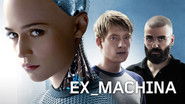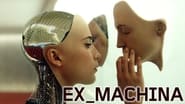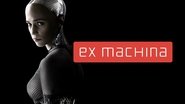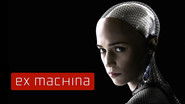StrictlyConfidential
Personally, I think that instead of the title "Ex Machina", this over-rated SyFy/Thriller's title should have been "Sex Machina".'Cause, if nothing else - When it came to the realm of sex - This "good-android-bad-android" story certainly didn't waste any time going all the way back to the Stone Age when defining the sex roles of men and women.What really killed me about android-Ava was that she never seemed to require any regular maintenance to keep her functioning in tip-top condition.'Cause if this story of A.I.-reality is set in the present time - I could never accept that Ava was a completely autonomous creation. No way.And, speaking about Ava's "creator" (that drunken dingleberry, Nathan) - I refuse to believe (for even a micro-second) that he had the intellect and ability to build such robotic wonders as he did (all by himself). This jerk was a despicable slime-ball.And, finally - I really resent movies, such as this, that use haunting, other-worldly music as a means to manipulate its audience by putting them into a trance-like state where they believe that what they are seeing on screen really matters.
theresamgill
This film was the directorial debut for Alex Garland who garnered attention for writing 28 Days Later and Sunshine (and even Dredd). The movie really didn't get much love at the box office (unlike that fast-movie car franchise), but it rightfully received some Golden Globe nominations for the acting. Even more impressively, it beat out films like Star Wars, The Revenant, and Mad Max for the Oscar for best visual effects. When you look at the aforementioned movies and see their 100 + million dollar budgets, it only makes it all the more impressive that Ex Machina won on a budget of 15 mil. All this talk about the awards and talented film crew is fine, but what really matters is what happens when you sit down (you can stand or squat if you want, I'll only slightly judge you) and actually watch the film. This film is 1 hour 57 minutes long. Why should you care? Well, if writer/director Garland wanted to provide crummy backstory and exposition at the beginning, he very well could have. Lucky for us, this man understands story structure and character arcs, and this understanding is why this movie is under 2 hours. So what is the story? Gleeson plays Caleb, a young programmer chosen to visit the remote house of the company's CEO Nathan (this takes up probably the first 2 minutes-keeps the pace going, the mystery of the story intact, and the ability to fully develop the characters through their actions in the film itself). Nathan, played by Oscar Isaac who was with Gleeson in Star Wars playing Poe (and he's been in numerous other hits), introduces Caleb to Ava. Ava is a female AI, and Nathan wants to see if she could pass the Turing test, using Caleb as the human element. Very briefly, this test basically has a human interacting with a cyborg/AI/robot. If the human can't tell that the person they're talking to isn't actually human, then the AI passed the test. The film essentially consists of 2 elements: Caleb and Nathan's interactions, and Caleb and Ava's interactions. Nathan is a peculiar, eccentric genius with a love of women and alcohol, and Caleb is much more innocent and reserved. The scenes with Caleb and Nathan function in many ways; for example, the slightest of foreshadowing is given through their allusions to classic mythology, literature, and philosophy. Also, the talks switch between being inside and out. And both the technologically enhanced house (unlike some sci-fi films, all the futuristic stuff is logically placed and actually is put to practical use) and the isolated surroundings are beautiful in stark, contrasting ways. The house has the slick, clean white look with vibrant, almost neon red and blue lights used throughout; and the world outside takes us away from any claustrophobia and allows the audience to relax in the lush greens, the flowing streams, and the warming sunlight. And in case you started getting lost in all of my explanations, above all, Caleb and Nathan's conversations are fun, well-written, and smart. When the 2 boys of the house are done talking, it's time to get down to business. Alicia Vikander plays Ava, and her performance is breath-taking. As much as I enjoy Scarlett Johansson, as far as anything related to cyborgs are concerned, Vikander's performance takes the artificial cake. Caleb and Ava's sessions start off basic, but as the questions become more relevant, layers upon layers are pulled back-both on an intellectual level and an emotional one. Does Ava's responses constitute as her consciousness replying? Sorry, ya spoilbrats, you'll have to watch the film for that answer. And it's an answer well worth watching for. The visuals are outstanding, the acting is superb, and the story structure is brilliant. It all adds up to one of the smarter and better films you watch with an ending that will probably surprise you (for better or worse). Heck, nerdy little me even applauds this movie's sound mixing. Seriously, pay attention any time Ava moves her body-- that noise alone is synthetic supremeness. We've seen the dumbed down side of robotics in I, Robot, and we've seen cyborgs integrated well in the Alien franchise. What we get in Ex Machina is the cyborg we didn't know we needed. It's simply an engaging and interesting movie in general, and for one that flew past the radar of nearly everyone in its theatrical release, it's high quality stuff. Check it out. And then check out the other films I mentioned in this review. I named a whole bunch of great films. Except that stupid franchise that has Vin Diesel saying "I don't have friends... I've got... family." Take my advice, Vin. Stick to lines like "Superman" and "I am Groot."
You can find this review and dozens of others at gillipediamoviereviews.blogspot.com




































